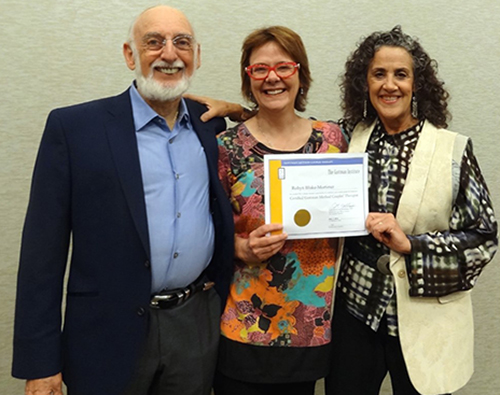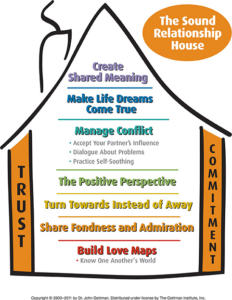Love is Love
Once that wonderful initial flush of falling in love settles, most couples find they have to make an effort to maintain the loving connection they both want. Often that is made more difficult by external pressures, the arrival of children or supporting ageing parents. Sadly, most couples wait for 6 years before they seek help. That allows time for resentments to build and difficulties to deepen. It is much harder to repair almost a decade of hurt than to address it in the early stages.
Although it takes courage to attend couples or marriage counselling it can be really helpful in revitalizing the romance and intimacy you desire but may have lost hope of ever receiving from your partner.
I am proud to be a Certified Gottman Method Couples Therapist. This approach is based on more than 20 years of research on what behaviours make relationships succeed or fail. It is not based on doctrine, a hunch or wishful thinking. I am the first South Australian and second Australian to meet the rigorous requirements to become a certified Gottman Method Couples Therapist.
When we look at the Gottman Model of The Sound Relationship House, we can be confident this provides an effective guide for where to intervene in any relationship.
I have used it with a wide variety of couples including;
- Heterosexual couples,
- LGBT couples
- Interfaith couples
- Mixed heritage couples
- Neurodiverse couples
- married and unmarried
- with children or without
- young or elderly couples and anything in between
The Gottman Method
If any of these levels or load bearing walls of the Sound Relationship House need work, the relationship is in trouble. Fortunately, there is a library of interventions to address those exact problems.
These facts were discovered by John Gottman and Peter Levine in longitudinal studies with newly wedded heterosexual couples. Later, these same findings were replicated with gay and lesbian couples. Love is love and the same principles apply even when there are some unique pressures, prejudices and challenges facing the LGBT communities. In the past it could even be difficult to find a therapist accepting of their sexual orientation.
Couples of mixed heritage or interfaith marriages are also welcome with their unique challenges and opportunities to develop their own traditions around holiday festivities and bringing up children. I have been enriched by my time in New York with the wonderful diversity of people I have met. It has been inspiring to work with these couples to develop acceptable compromises. It has helped me to learn about cultural differences as well as the common ground we all share.
Another group who can find it difficult to find appropriate relationship counselling are those who are in the helping professions themselves; educators, doctors, social workers, members of the clergy, or fellow psychologists. I am flexible with my scheduling and readily acknowledge the skills these professionals bring to treatment. I know firsthand how sobering it can be to be on the other side of the room, having to receive advice rather than being in the expert position. Especially in those situations, we pool our resources.
Neurodivergent Couples
Neurodivergence is a blessing and sometimes a challenge in a world which is not designed for us.

Neurodivergent people make the world go around! It is exciting to be part of the neurodivergent affirming movement which focuses on the many strengths of having a different neurology, or brain wiring to the majority of the population.
The key word is difference, not deficiency or disability. That is not how we were trained and so many neurodivergent people were treated as the problem who needed to be fixed, when they presented for therapy. That was soul destroying.
It is no wonder that Neurodivergent Couples are seriously under-served in the area of couples counselling and they come with unique challenges, as well as delights. These are couples where one, or both could be Autistic, or ADHDers, or AuDHDers with a combination of neurotypes. Some people might identify with other labels such as “Aspies”, or being “on the Spectrum” but that language is less commonly used now, for good reasons.
If you have a history of being judged as quirky or “the geek” it might have been difficult to read social cues. Possibly you were mainly interested in reading books or researching technical facts. Maybe you had an all consuming, narrow interest which was not shared by your peers. When you tried to share your enthusiasm about detailed knowledge, you may have been shut down or even bullied. Or maybe you were constantly in trouble for impulsive behaviours or “rudely” interrupting people to share your ideas.
Social gatherings are usually stressful and you need a lot of down time to re-charge after the effort of trying to observe the social niceties. At work you may know how to masquerade as a so-called “normal” or neurotypical person but it leaves you depleted when you get home.
It can be really hard to feel like you can’t please your partner, no matter how much you try.
If you are neurotypical and partnered with an ADHDer or an Autistic person, it can be very frustrating. Despite their wonderful strengths of loyalty, creativity and intelligence, they sometimes do not seem to remember things that are important to you. You might even start to see them as selfish. You might feel increasingly lonely and even invisible.
Many people in this situation say they feel as if they are in a parent/child relationship instead of being in an intimate and equal partnership.
Of course, that dynamic does not help your sexual intimacy! In times of conflict, it is difficult for both of you to understand the other’s point of view because it feels like you are speaking two different languages!
It doesn’t have to be this hard! I have structured exercises and a model to support neurodivergent couples. This has become a special interest for me, drawing on my lived experience with these relationships and the way my brain is wired. It is rewarding to draw on my previous teaching career, specifically my expertise with gifted students and adaptive education to assist these intelligent, values driven and creative couples. In 2023 I developed a model of Neurodivergent Friendly Couples Therapy (NFCT) and have trained other therapists in this practical approach. It has been very well received by professionals as well as neurodivergent couples who have assisted me in its development. I incorporate NFCT with the Gottman Method when my assessment shows it is likely to be helpful.
Even if you only exhibit some of these traits, you are likely to benefit from the very concrete skills I can teach you during sessions. It is important to remember that neurology matters and to assume good intent. It is rare for either partner to be deliberately hurtful or mean. Instead, the automatic behaviours are likely to be a result of hard wiring and familiar ways of processing the world. Both partners can learn from each other to improve their communication.
What is involved in Couples Therapy at Tuned in Couples®?
Gottman Method Couples Therapy consists of 3 main parts; Assessment, Treatment and ‘Wrapping Up’.
Gottman Assessment Phase
During this phase, I have a joint meeting with you together for 90 minutes. Then you are asked to complete the on-line questionnaire which provides incredibly rich information about the relationship and your specific concerns. During the next week, I meet with each of you individually for 50-60 minutes to share more of your personal history and goals for therapy. In the final 90-minute session, I share my recommendations for treatment and we set the goals for therapy. That is when you decide if you would like to continue to work with me.
Gottman Treatment Phase
These sessions are usually held together and last for 90 minutes at a time. It just does not work to try to squeeze couples work into a shorter session because I want both of you to have the chance to speak and be heard.
There may be the times when I feel it useful to do extra sessions with one of you individually. You will have the chance to raise any concerns and we work on the skills to improve communication and intimacy.
The length of treatment varies according to your specific goals and issues. I ask that you commence with weekly sessions which can later be moved to fortnightly as you become more comfortable using the interventions independently.
Gottman ‘Wrapping Up’ Phase
Once you have consistently reported that the issues are resolved, I focus on making sure you know how to manage any possible relapse before ending therapy. You will have handouts and homework exercises to feel confident in monitoring your relationship and addressing future issues as they arise.
This is designed as short term, solution focused therapy. The goal is to have you able to work independently to maintain a good relationship without seeing me.
You are encouraged to return for a 6 monthly follow up session to maintain the progress we have gained. I like to think of this as spring cleaning your house or bringing your car in for a regular tune-up.
Intensive consultations
If you live out of town or are time pressured I offer 2-3 Day Intensives. The Gottman’s refer to this as Marathon Therapy.
Sometimes it is helpful to have intensives when longer sessions are required e.g. when the couple is in crisis or processing one particularly difficult issue such as an affair. It allows you to compress months of weekly sessions into the weekend. You are still likely to benefit from later follow up sessions but it allows you to kick start the process.
This is an investment of your time and money. Private Health plans and Medicare do not cover these intensive services.
If any of these scenarios sound like you, reach out by email here.




